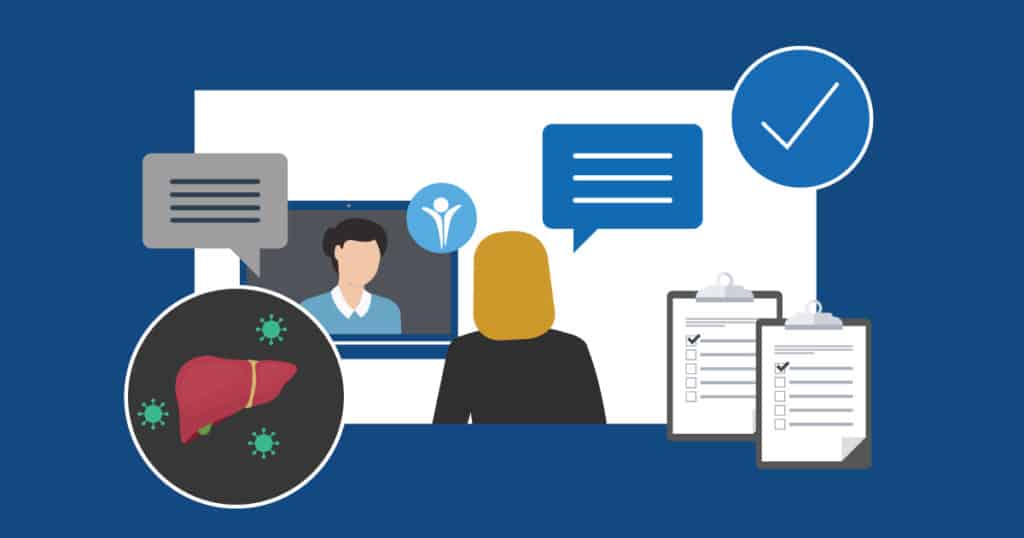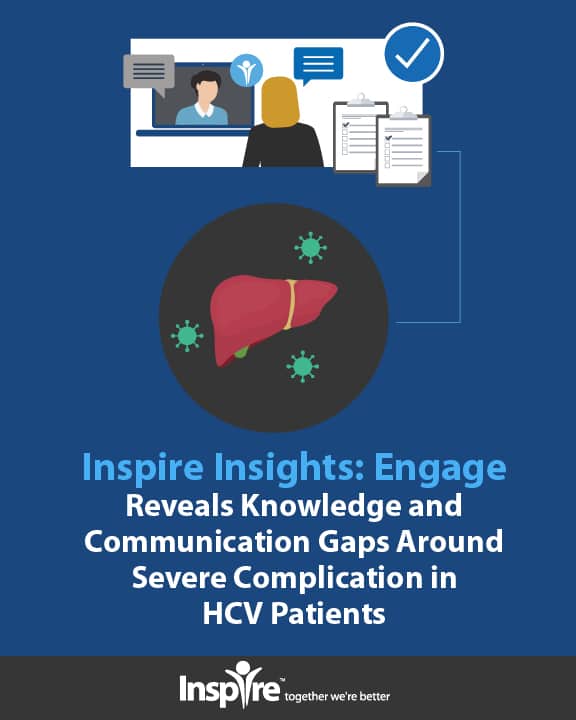Qualitative analysis informs all of Inspire’s research offerings: An Inspire Engage case study

“Where is the understanding we have lost in knowledge?” ~T. S. Eliot 1
Inspire’s research team approaches all its work by first becoming immersed in patients’ and caregivers’ “in-the-moment” sense-making. The tool they use, qualitative research, is the listening side of scientific exploration. In its many formats – social listening, thematic analysis, linguistic analysis – qualitative research makes sense of phenomena using the meanings that people bring to them, understanding experiences through their view of the world. 2
An early marketing strategy team came to Inspire to better understand the impact of a specific, severe complication that patients with Hepatitis C (HCV) experience. Their goal was to understand the impact on quality of life and other outcome variables. To address this, Inspire’s research team explored the patient journey of members diagnosed with HCV through a qualitative lens, then created quantitative survey tools.
Hepatitis C, Cures and Follow-up
Imagine discovering you have had an illness for decades but had no symptoms. Add to this the complication that you may not know exactly when or how you were infected. Further, imagine learning that your infection could have occurred through a blood transfusion that saved your life or an inadvertent needle stick you got as a healthcare worker. Finally, envision realizing that the disease has caused significant damage to a major organ, increasing your risk of cancer and possibly necessitating a transplant.
Many members of the American Liver Foundation Liver Disease Support Community on Inspire and the Hepatitis C Support Community on Inspire face a daunting and overwhelming cascade of emotions that they must deal with when diagnosed with hepatitis. One member explained their diagnosis this way.
“You may have lived a perfectly healthy life and still have the virus. The reasons are unknown. The blood transfusion in _[year]___ is the likely culprit. I had a transfusion in _[year]__ and that is how I got the virus.”
Another member wrote,
“having hep c can make you feel like crap, with no energy and other ailments that are too numerous to mention….The news of being infected with hep c is devestating [sic] enough to make you feel that there is no hope.”
With the advent of new oral antiviral treatments, beyond interferon, cure of the infection has dominated discussions in the communities. Ninety percent of those taking these agents achieve sustained virologic response (SVR) or cures.3
“Recently, I completed a _[number] _ month regimen of _[medication] _ and have taken two blood tests and as things stand right now I am cured, or, if you prefer, I am SVR which is certainly cause for celebration. I wanted to share this news with the folks on this website who know me and my situation.”
Unfortunately, the focus on achieving SVR and celebration can obscure the problems caused by the virus, specifically liver fibrosis and/or liver decomposition. Although many achieve SVR and celebrate their cure of the virus, they may not realize the damage that their liver has sustained.
“I’m constantly exhausted.. so tired that many days I can’t even get out of bed, nauseous,headaches, strange skin rashes or hives,… I barely have the energy to drive to the grocery store…. It’s really frightening. It’s almost like I have no will to live because this is been going on for months.
Has anyone else had strange side effects after completing treatment?
I just had a gamut of blood tests ordered by my GP and everything was normal except for a little high glucose…which is srange [sic] because I don’t get a lot of sugar and pretty much eat a healthy diet.”
Symptoms of cirrhosis, the cumulative damage after liver years of inflammation, include itching and rashes, bruising, development of insulin resistance and type 2 diabetes, problems with concentration, sleep, memory.4 Those with this damage are at heightened risk of liver cancer. Yet, as the member above demonstrates, many patients do not realize or understand what they are describing in their posts.
Achieving SVR has been associated with reductions in risks of liver cirrhosis and need for liver transplants. One meta-analysis found that 53% of those who are HCV-SVR see a regression in their cirrhosis.4 Yet the variability of fibrotic damage in Hepatitis C patients, as well as the differences in regressions in cirrhotic changes to the liver that can occur in those with HCV-SVR led the American Gastroenterological Association Institute to issue a Clinical Practice Update in 2017.3
Because of their focus on understanding through qualitative assessment, Inspire’s research team uncovered a lack of knowledge of the damage patients sustained while the virus attacked their body which merited further exploration and which added substantial value to the client’s Inspire Insights: Engage purchase. Read our case study, “Inspire Insights: Engage Reveals Knowledge and Communication Gaps Around Severe Complication In HCV Patients.”
Inspire offers a trusted community to patients and caregivers. Our goal with this blog, this website and our content is to provide the life science industry access to the true, authentic patient voice. In so doing, we support faithful operationalization of patient-centricity. Take a look at our case studies, eBooks and news outlet coverage.
References:
1 Eliot, T. “Choruses from ‘The Rock.’” Retrieved from http://www.arak29.am/PDF_PPT/6-Literature/Eliot/Chtherock_eng.htm
2 Denzin N. and Lincoln Y., eds. (1994). Handbook of qualitative research. London: Sage Publications.
3 Jacobson, I., Lim, J. and Fried, M. (2017). American Gastroenterological Association Institute Clinical Practice Update—Expert Review: Care of Patients Who Have Achieved a Sustained Virologic Response After Antiviral Therapy for Chronic Hepatitis C Infection, Gastroenterology. 152:1578–1587. Retrieved from https://www.gastrojournal.org/article/S0016-5085(17)30327-X/pdf
4 The Progression of Liver Disease. The American Liver Foundation Website. Retrieved from https://liverfoundation.org/for-patients/about-the-liver/the-progression-of-liver-disease/#1503432933768-040e8645-d918
5 Akhtar, E.,Manne, V. and Saab, S. (2015). Cirrhosis regression in hepatitis C patients with sustained virological response after antiviral therapy: a meta-analysis. [Abstract]. Liver International. 35(1):30-6. Retrieved from https://www.ncbi.nlm.nih.gov/pubmed/24766091






